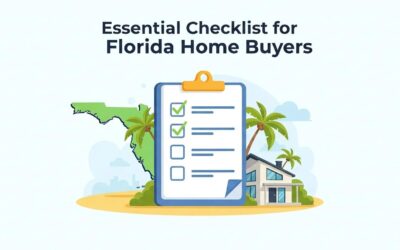Florida, known for its picturesque beaches, vibrant atmosphere, and favorable climate, is often considered an ideal location for purchasing a home. As the real estate market in this region continues to thrive, potential homeowners are increasingly drawn toward the prospect of owning property in the Sunshine State.
However, it is crucial to acknowledge that various hidden costs may be associated with buying a home in Florida, which could influence prospective buyers’ decision-making processes. The concept of ‘hidden costs’ refers to any additional expenses homeowners incur during or after their purchase transactions have been concluded.
Often overlooked yet ultimately significant elements such as maintenance fees, insurance premiums, taxes, and utility bills can substantially impact overall financial commitments made by individuals seeking residential properties within the state’s borders. This article aims to delve deeper into these factors while providing readers with valuable insights into how these hidden costs might affect their long-term economic stability amidst Florida’s thriving real estate landscape.
Property Taxes And Fees
Property Taxes and Fees: Essential Components, Hidden Burdens, Unanticipated Consequences.
In pursuing homeownership in Florida, prospective buyers often encounter a complex landscape of financial obligations. While mortgage payments may represent the most apparent cost of purchasing a home, hidden expenses such as property taxes and fees can significantly impact a homeowner’s budget. Understanding these costs is crucial for individuals seeking to make informed decisions regarding their housing investments.
Florida tax exemptions and community development fees are two key factors influencing property-related expenditures in the Sunshine State. Property taxes are an essential source of funding for local government services, including education, infrastructure maintenance, and public safety initiatives. Homeowners in Florida can benefit from certain tax exemptions designed to alleviate some of this burden; however, these benefits are only sometimes available or guaranteed.
Additionally, many communities impose development fees on new residential construction projects to cover the costs of expanding public amenities such as water and sewer systems or recreational facilities. These charges vary by location and can be substantial – making it imperative for potential buyers to consider how they might affect overall affordability when evaluating properties.
Navigating through these intricate fiscal considerations requires diligence and foresight from aspiring homeowners. As one delves deeper into this realm of taxation intricacies and monetary outlays, awareness of possible impacts becomes paramount. Identifying strategies for mitigating unforeseen expenses will prove invaluable in achieving long-term financial success within Florida’s dynamic real estate market.
With this foundation established, attention must now shift towards another critical component that plays an equally significant role in determining total ownership expenditures – homeowners insurance policies incorporating flood coverage provisions, which warrant further examination given their prominence within coastal regions characterized by vulnerability to inclement weather events, such as hurricanes, tropical storms, and heavy rainfall. These insurance policies protect homeowners from potentially devastating financial losses due to property damage or destruction caused by flooding. Consequently, homeowners in flood-prone areas should carefully assess their risk exposure, the adequacy of their insurance coverage, and the potential impact of such costs on their overall budget and financial stability.
Homeowners Insurance And Flood Coverage
When buying a home in Florida, homeowners should know the additional costs associated with proper insurance coverage.
Homeowners insurance is necessary to protect the home from damage from fires and other natural disasters, such as hurricanes.
Homeowners should also purchase flood insurance as the risk of flooding is exceptionally high in Florida.
Flood insurance policies are separate from homeowners insurance and provide additional coverage in the event of a flood.
Homeowners Insurance
In the Sunshine State, a sturdy roof over one’s head and walls that can withstand hurricane-force winds are crucial aspects of homeownership. Yet, even with such robust construction, unforeseen events necessitate adequate homeowners insurance coverage to protect against financial setbacks.
Obtaining comprehensive protection involves evaluating policy comparisons, seeking insurance discounts, and understanding how this essential safety net factors into home-buying expenses. Navigating various policies requires an in-depth analysis of numerous elements, including dwelling coverage limits, personal property protection, and liability coverage.
Conducting thorough policy comparisons allows prospective homeowners to identify the most cost-effective solution tailored to their needs while taking advantage of available insurance discounts. Discounts may be offered based on factors such as installing wind-resistant features or bundling multiple insurance policies. Florida residents can balance affordability and peace of mind by reducing premium costs without sacrificing necessary coverage levels.
Moreover, due to Florida’s vulnerability to flooding from tropical storms and hurricanes, securing flood coverage is another critical aspect of safeguarding one’s investment. While not typically included in standard homeowners insurance policies, flood protection must be sought separately through the National Flood Insurance Program (NFIP) or private carriers specializing in flood insurance.
Recognizing its importance as part of total housing expenditures enables future Floridians to budget accordingly, ensuring they feel secure within their homes despite nature’s unpredictability.
Flood Coverage
In light of the heightened risk posed by Florida’s susceptibility to tropical storms and hurricanes, securing flood coverage becomes an indispensable component of a comprehensive homeowners insurance plan. Flood zone impact significantly determines the necessity and cost of such policies for potential home buyers.
By carefully evaluating property locations within designated flood zones, individuals can ascertain their vulnerability to flooding events and make informed decisions regarding required protection measures.
Elevation certificates are another valuable tool in this process, providing essential information on a property’s elevation relative to base flood levels – a critical factor when assessing potential flood risks. Obtaining these certificates enables prospective homeowners better to comprehend their properties’ specific exposure to flooding hazards, allowing them to tailor their insurance policies accordingly while also considering any possible mitigation actions that could be implemented to reduce those risks.
This understanding ultimately aids in striking a balance between necessary safeguarding measures and affordability constraints.
By incorporating flood coverage considerations into the overall assessment of homeownership expenses, future Floridians reinforce their financial resilience against nature’s unforeseen calamities and foster a sense of community belonging through collective preparedness efforts. With thorough policy comparisons and harnessing available discounts, ensuring adequate flood protection contributes significantly towards creating secure living environments amidst the Sunshine State’s dynamic weather conditions.
Maintenance And Repair Expenses
Moving from the topic of insurance coverage, homeowners face another significant cost in Florida: maintenance and repair. This aspect of home ownership can be costly due to the unique challenges brought about by the state’s climate and environmental factors. As a prospective homeowner, it is essential to consider these expenses when calculating your budget for purchasing a property.
Roof replacements are one of the most substantial costs any homeowner may encounter. In Florida, roofs are subjected to harsh weather conditions such as hurricanes, heavy rainstorms, and intense sunlight throughout the year. These elements can cause accelerated wear and tear on roof materials, leading to an increased likelihood of needing replacement or repairs sooner than in regions with milder climates.
Besides this significant expense, pest control services are vital in maintaining a comfortable living environment in Florida homes. The humid subtropical climate creates an ideal breeding ground for pests like termites and roaches that can damage properties if not adequately controlled.
Another crucial consideration when evaluating the hidden expenses associated with buying a home in Florida is allocating funds for regular upkeep tasks necessary to ensure structural integrity and longevity. For example, exterior painting may need more frequent touch-ups due to sun exposure and mildew growth caused by humidity levels typical to the area. Similarly, preventative measures against wood decay should be implemented because moist air fosters fungi development responsible for weakening wooden structures over time.
Incorporating these ongoing expenditures into your overall estimate will give you a better understanding of what it truly costs to own a residence in this beautiful part of America while fostering feelings of belonging within its diverse community settings.
With these considerations around maintenance and repair expenses accounted for, it becomes even more critical to address utility bills’ impact on overall financial standing and adapt homes for optimal climate control efficiency across all seasons that make up life under Floridian skies.
Utility Bills And Climate Control
One significant aspect of homeownership in Florida that potential buyers should consider is the cost associated with utility bills, particularly those related to climate control.
Given the state’s warm temperatures and high humidity levels year-round, residents often rely on air conditioning systems to maintain a comfortable living environment. Consequently, this increased usage can lead to substantial energy consumption, resulting in higher-than-average monthly utility expenses for homeowners.
To mitigate these expenses while ensuring optimal comfort, individuals considering purchasing a home in Florida may want to invest in energy-efficient upgrades such as smart thermostats or high-efficiency HVAC systems.
Smart thermostats allow users to remotely monitor and adjust temperature settings based on personal preferences and schedules, promoting energy conservation and reducing overall expenditures. Furthermore, upgrading an existing HVAC system or installing one with a high Seasonal Energy Efficiency Ratio (SEER) rating will enhance performance and minimize wasteful energy use without compromising indoor comfort levels.
As prospective homeowners navigate the process of acquiring property in Florida, it becomes essential for them to account for these hidden costs when determining their budgetary constraints.
By acknowledging the importance of adequate climate control measures and strategically investing in advanced technologies like smart thermostats or other energy-saving solutions, they can successfully manage long-term utility expenditures while enjoying all this unique region offers.
With this knowledge, future residents can confidently approach the additional financial obligations presented by closing costs and legal fees in purchasing a new home.
Closing Costs And Legal Fees
Transitioning from considering utility bills and climate control, another significant aspect to consider when purchasing a home in Florida is the closing costs and legal fees. These expenses are essential to any real estate transaction and should be paid by potential buyers.be noticed
The intricacies of the home-buying process often necessitate legal jargon explanations that may seem daunting for first-time buyers or those unfamiliar with real estate transactions. Legal professionals can offer valuable assistance in helping both parties understand their respective rights and obligations throughout this complex procedure.
Various documents, such as title searches, purchase agreements, mortgage contracts, and property surveys, need reviewing. Employing an attorney ensures that all paperwork is comprehensively analyzed for accuracy and legality while safeguarding against unforeseen issues that could arise later on. Additionally, these experts can guide alternative financing options for buyers requiring more flexible loan terms or needing help securing traditional mortgages.
In light of these considerations, it becomes evident that allocating funds towards closing costs and legal fees is a prudent investment for anyone looking to establish roots within Florida’s vibrant communities. By doing so, prospective homeowners will benefit from the specialized knowledge offered by industry professionals, thus streamlining the acquisition process and protecting their hard-earned assets long-term.
Aspiring Floridian residents should remember that even though these hidden costs may appear burdensome initially, they ultimately serve as insurance policies against future complications arising from inadequately managed real estate transactions—ensuring peace of mind for years to come.
Frequently Asked Questions
How Do Natural Disasters, Such As Hurricanes Or Flooding, Impact The Overall Costs Of Owning A Home In Florida?
How can one overlook the significant impact of natural disasters, such as hurricanes or flooding, on the overall costs of owning a home in Florida?
As a state highly susceptible to these catastrophic events, homeowners must consider the financial implications and the potential emotional toll.
Hurricane insurance is essential in safeguarding against losses incurred during storm-related incidents.
Furthermore, flood preparation measures are crucial for mitigating damage from water intrusion into properties.
Real estate economics experts emphasize that understanding and accounting for these disaster-related expenses is vital when assessing home ownership affordability in Florida.
By acknowledging and preparing for these hidden costs upfront, prospective homeowners can cultivate a sense of belonging within their chosen community while fostering resilience in times of turbulence.
Are There Hidden Costs Or Fees Associated With Owning A Home In A Gated Community Or Planned Neighborhood In Florida?
Owning a home in a gated community or planned neighborhood in Florida offers various benefits, such as increased security, well-maintained common areas, and access to numerous amenities like swimming pools and fitness centers.
However, these Gated Community Perks often come with additional costs known as Neighborhood Association Fees. These fees are typically charged monthly or annually to homeowners within the community and contribute to maintaining shared spaces, funding recreational facilities, and providing essential services such as trash collection or landscaping.
While living in such communities can enhance one’s sense of belonging and overall lifestyle quality, it is crucial for potential buyers to thoroughly assess the financial implications of these extra expenses before committing to purchasing a property within a gated community or planned neighborhood.
What Are Some Potential Financial Benefits Or Incentives For Purchasing Energy-Efficient Or Eco-Friendly Homes In Florida?
As the saying goes, ‘a penny saved is a penny earned,’ when purchasing energy-efficient or eco-friendly homes in Florida, potential financial benefits abound.
Homebuyers may find themselves eligible for various incentives that can help offset initial expenses while contributing to long-term savings.
Energy rebates from utility companies are commonly offered to homeowners who invest in energy-efficient appliances, HVAC systems, or renewable power sources such as solar panels.
Furthermore, utilizing sustainable materials during construction reduces environmental impacts and enhances building durability, decreasing maintenance costs.
Embracing these green alternatives proves advantageous not just for the pocketbook but also for fostering a sense of belonging within communities committed to safeguarding our planet’s future.
How Do The Costs Of Owning A Home In Florida Compare To Other Popular Retirement Or Vacation Destinations In The United States?
In comparing the costs of owning a home in Florida to other popular retirement or vacation destinations within the United States, it is essential to consider factors such as property taxes and insurance rates.
When examining Florida property taxes, one may find that they tend to be relatively moderate compared to other states; this can be attributed to the state’s homestead exemption policy, which offers significant tax reductions for primary residences.
However, I would like to point out that insurance rates in Florida are often higher than those observed in similar locations due to increased risks associated with natural disasters like hurricanes and flooding.
Consequently, while lower property taxes may have an initial appeal for prospective homeowners, potential buyers should carefully weigh these benefits against potentially elevated insurance expenses before deciding to purchase a residence in the Sunshine State or another sought-after destination.
Are Any Specific Financial Resources Or Assistance Programs Available For First-Time Homebuyers Or Veterans Looking To Purchase A Home In Florida?
In Florida’s sun-drenched paradise, a veritable treasure trove of financial resources and assistance programs exist to aid first-time homebuyers and veterans in their quest for homeownership.
Among these bountiful offerings are first-time buyer incentives such as the Florida Housing Finance Corporation’s (FHFC) Homebuyer Loan Program, which offers 30-year fixed-rate mortgages with down payment and closing cost assistance.
Additionally, the FHFC boasts a Mortgage Credit Certificate program designed to provide annual federal tax savings for eligible borrowers.
For those who have bravely served our nation, veteran home assistance takes center stage through VA loans backed by the U.S. Department of Veterans Affairs, featuring competitive interest rates, no down payment requirements, and lenient credit qualifications.
Thus, prospective Floridian homeowners can confidently embark on their journey towards residential bliss equipped with unparalleled monetary support tailored specifically for them.
Key Takeaways and Final ThoughtsConclusion
In conclusion, the hidden costs of purchasing a home in Florida are akin to an iceberg lurking beneath seemingly tranquil waters.
Prospective buyers must be vigilant and well-informed about potential financial implications associated with:
- Natural disasters
- Gated communities
- Energy efficiency incentives
- Comparisons to other popular locales
- Available resources for first-time or veteran buyers
By thoroughly exploring these factors before committing to a purchase, prospective homeowners can ensure their investment remains financially viable while enjoying Florida’s warmth and beauty.







